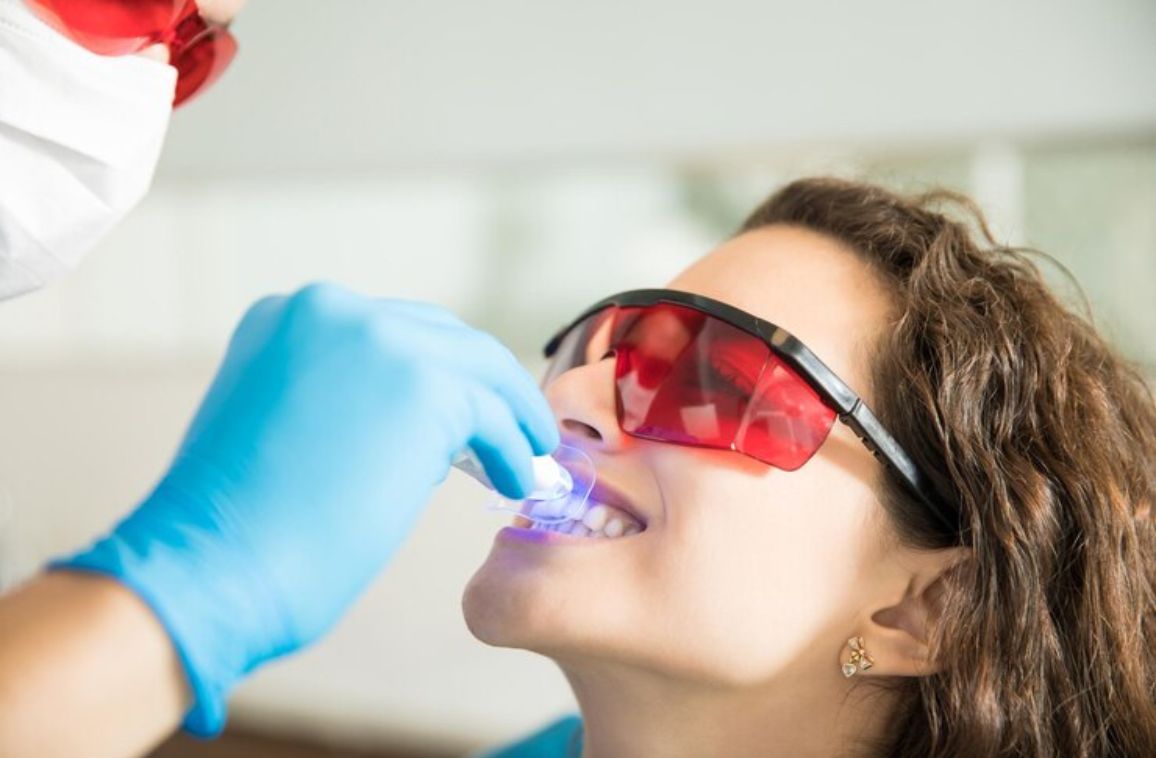A radiant, white smile on account of teeth-whitening treatments indicates a sophisticated cosmetic dentistry approach. It boosts confidence makes a person appear healthier and also enhances overall facial aesthetics.
Teeth whitening treatments are manifold, and it is only natural to select a treatment that suits oneself. From professional treatments to DIY remedies, it can indeed be overwhelming to select the right teeth-whitening treatment option for one’s specific needs.
Understanding Teeth Whitening
Teeth whitening is rather a cosmetic dental procedure designed to lighten the color of one’s teeth. It does work by breaking down stains and also discoloration, improving the appearance of one’s smile. The active ingredients in most whitening products are, of course, typically either hydrogen peroxide or carbamide peroxide, both of which are indeed effective in breaking down the chemical bonds that tend to cause stains. Whitening can be done via in-office treatments administered by a dentist or even via at-home treatments that range from custom trays to perhaps over-the-counter products. The process entails both extrinsic stains (surface stains) and intrinsic stains (deeper discoloration inside the tooth structure).
In-Office Professional Whitening
Professional in-office whitening happens to be the most popular and effective option. The procedure is carried out at the dentist’s office, making use of powerful whitening agents that are activated with special light or lasers.
Advantages:
- Immediate Results: The whitening process takes about 1-2 hours, and dramatic results can be seen immediately after the procedure.
- Expert Supervision: The treatment is rather performed by a trained professional, thus reducing the risk of gum irritation or other side effects.
- Custom Treatment: The dentist can assess one’s specific needs and also adjust the treatment accordingly for the best possible outcome.
Disadvantages:
- Cost: Professional whitening is often a very expensive option.
- Temporary Sensitivity: Few individuals may experience tooth sensitivity following the treatment, though this typically does subside after a few days.
At-Home Whitening Kits
At-home whitening kits are, of course, designed for those who really want to whiten their teeth on their own schedule. These kits are available with trays, gels, or strips that can be applied at home over several days or weeks.
Advantages:
- Cost-Effective: At-home kits are more affordable.
- Convenience: The patient can whiten his or her teeth at one’s own pace and in the comfort of one’s home.
- Customizable: Several people at home find that they are customizable trays or applicators, thus permitting a more tailored fit.
Disadvantages:
- Slower Results: While effective, at-home treatments take longer to deliver noticeable results, usually a few weeks.
- Risk of Overuse: If not used properly, these products can cause uneven results or irritation of one’s gums.
Over-the-Counter Whitening Products
Over-the-counter (OTC) whitening products include whitening toothpaste, strips, gels, and pens. These products are indeed easy to find and are often marketed as affordable and also quick fixes.
Advantages:
- Accessibility: OTC products are rather widely available at grocery stores, drugstores, and even online.
- Affordable: They are the least expensive.
- Easy to Use: Most OTC products are simple to apply, making them convenient for users with busy schedules.
Disadvantages:
- Limited Effectiveness: OTC products typically contain lower concentrations of whitening agents. Thus, results may be less dramatic and slower.
- Surface Stains Only: These products are usually better at treating surface stains and less effective on deep or even intrinsic stains.
Natural Teeth Whitening Remedies
Natural remedies for teeth whitening have indeed gained popularity as people look for alternative solutions that are often considered safer and also more environmentally friendly. Common natural whitening options are baking soda, activated charcoal, and oil pulling with coconut oil.
Advantages:
- Cost-Effective.
- Minimal Chemicals.
Disadvantages:
- Unproven Effectiveness.
- Potential Damage.
Factors to Consider When Choosing a Whitening Method
- Effectiveness.
- Cost.
- Sensitivity.
- Convenience.
- Duration of Results.
Conclusion
Teeth whitening treatments are several, and careful thought needs to be given as to which treatment suits one’s dental health issue.



